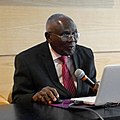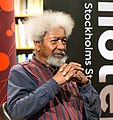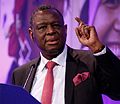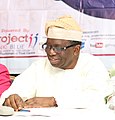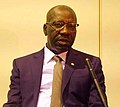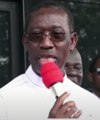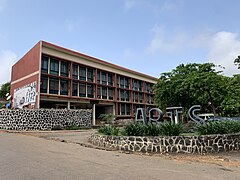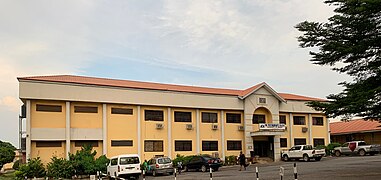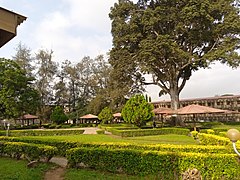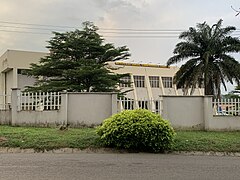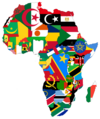University of Ibadan
 | |
Former names | University College Ibadan |
|---|---|
| Motto | "Recte Sapere Fons" (To think straight is the fount of knowledge). |
| Type | Public |
| Established | 1948 |
| Chairman | Chief John Odigie Oyegun |
| Chancellor | Saad Abubakar, Sultan of Sokoto |
| Vice-Chancellor | Kayode Adebowale |
| Students | 41,743[1] |
| Location | , , 7.4433° N, 3.9003° E |
| Campus | Urban, Over 2,550 acres |
| Colours | Indigo-blue and gold |
| Website | www |

The University of Ibadan (UI) is a public research university in Ibadan, Nigeria.[2] The university was once a college of the University of London. The college was established in 1948 as University College Ibadan, one of many colleges within the University of London.[3] It became an independent university in 1962 and is the oldest degree-awarding institution in Nigeria. Through its graduate network, the University of Ibadan has contributed to the political, industrial, economic and cultural development of Nigeria.[4]

History
[edit]
The university was established in 1948 as the University College, Ibadan, a college of the University of London, which supervised its academic programmes and awarded degrees until 1967.[5][6][7] The establishment came as a result of a recommendation from the Asquith and the Elliot Commissions on Higher Education in the then-British colonies, that two University Colleges of the University of London be set up in Ghana[8] and Nigeria.[9] Before 1948, Yaba College had been founded in 1932 in Yaba, Lagos, as the first tertiary educational institute in Nigeria, focused primarily on providing post-secondary vocational education and teacher training to Africans.
However, the limited aims of Yaba College and clamour by Nigerian nationalists for self-improvement and uninhibited education led to the establishment of University College Ibadan as the first degree-awarding institution in Nigeria in 1948.[10][11] Staff and students from Yaba Higher College were transferred to Ibadan to form the new University College Ibadan.[12]
Modelled after the British university system, Kenneth Mellanby was appointed in 1947 as its first principal, and he inaugurated the university college on 18 January 1948.[13] The sod of its permanent site was cut on 17 November 1948, a date now known as its Founders' Day. The university's first buildings were designed by eminent modernist architects Maxwell Fry and Jane Drew.[14] Following the tropical modernist style, the 1950s construction comprised administrative blocks, residential colleges and academic facilities.[15]
Following Nigeria's independence in 1960 and the subsequent drive to domesticate several institutions, UCI became an established full-fledged independent university in early 1962 and thus, the name changed to University of Ibadan.[16]
In late 1963, on the university playing fields, with a celebration marked by talking drums, the Rt. Hon. Sir Abubakar Tafawa Balewa, the first Prime Minister of independent Nigeria, became the first Chancellor of this independent university. The first Nigerian vice-chancellor of the university was Kenneth Dike, after whom the university library is named.[17]
Rankings and reputation
[edit]| University rankings | |
|---|---|
| Global – Overall | |
| ARWU World[18] | 801-900 (2022) |
| CWUR World[19] | 1172 (2022-2023) |
| THE World[20] | 401–500 (2022) |
| USNWR Global[21] | =425 (2022) |
| Regional – Overall | |
| THE Africa[22] | =6 (2022) |
| USNWR Africa[23] | 7 (2022) |
| National – Overall | |
| ARWU National[18] | 1 (2022) |
| CWUR National[19] | 1 (2022-23) |
| THE National[24] | 1 (2022) |
| National – Life sciences and medicine | |
| USNWR Medical[25] | 158 (2022) |
The university consistently ranks as one of the best in Nigeria.[26]
Administration
[edit]The current principal members of the university administration are:[27]
| Office | Holder |
|---|---|
| Visitor | Bola Tinubu |
| Chancellor | Sultan Sa'adu Abubakar, 20th Sultan of Sokoto[28] |
| Pro-Chancellor & Chairman | Chief John Odigie Oyegun |
| Vice-Chancellor | Professor Kayode Oyebode Adebowale |
| Deputy Vice-Chancellor (Administration) | Professor E.O. Ayoola |
| Deputy Vice-Chancellor (Academic) | Professor Aderonke M. Baiyeroju |
| Deputy Vice-Chancellor (Research, Innovation and Strategic Partnerships) | Professor Oluyemisi A. Bamgbose |
The university is made up of 92 academic departments organized into 17 faculties, namely; Arts, Science, Basic Medical Sciences, Clinical Sciences, Agriculture, the Social Sciences, Education, Veterinary Medicine, Pharmacy, Technology, Law, Public Health, Dentistry, Economics and Management Sciences, all Renewable Natural Resources, Environmental Design and Management, and Multidisciplinary Studies. The Faculties of the Basic Medical Sciences, Clinical Sciences, Public Health and Dentistry are organized as a College of Medicine. The university has other academic units, among which are: Institute of Child Health, Institute of Education, Institute of African Studies, Centre for Child Adolescent and Mental Health, Centre for Entrepreneurship and Innovation (CEI), Institute for Advanced Medical Research and Training (IAMRAT), Institute of Cardiovascular Diseases, Centre for Drug Discovery, Development & Production (CDDDP) and Centre for Control & Prevention of Zoonosis (CCPZ).[29] The recently established Infectious Diseases Institute (IDI), School of Business (UISB) and National Institute for Maternal, Child & Neonatal Health (NIMCNH) have commenced operation.[29]
The University of Ibadan has 15 halls of residence that provide accommodation for about 30% of the population of students in the regular studies mode. Some of its popular halls include Lord Tedder Hall, Kenneth Mellanby Hall, Sultan Bello Hall, Nnamdi Azikiwe Hall, Independence Hall, Tafawa Balewa Hall, Kuti Hall, Queen Idia Hall, Queen Elizabeth Hall and the Obafemi Awolowo Hall – which is the largest female hall in West Africa. The university has a total staff strength of 5,339 with 1,212 housing units for both senior and junior staff.[30] The university has residential and sports facilities for staff and students on campus, as well as separate botanical and zoological gardens.[31]
Faculties
[edit]- Agriculture and Forestry
- Arts
- Basic Medical Sciences
- Clinical Sciences
- Dentistry
- Education
- Law
- Pharmacy
- Public Health
- Science
- Technology
- The Social Sciences
- Veterinary Medicine
- Renewable Natural Resources
- Environmental Design and Management
- Economics and Management Sciences
- Multidisciplinary Studies
List of available academic programmes/courses
[edit]AGRICULTURE[33]
1 Crop and Horticultural Science
3. Crop Protection and Environmental Biology
4. Agricultural Economics
5. Agricultural Extension and Rural Development
6. Soil Resources Management
RENEWABLE NATURAL RESOURCES
1 Aquaculture and Fisheries Management
2. Ecotourism and Wildlife Management
3. Forest Resources Management
4. Social and Environmental Forestry
COLLEGE OF MEDICINE[34]
4 Biochemistry
5 Physiology
6 Human Nutrition and Dietetics
7 Nursing Science
8 Medical Laboratory Science
PHARMACY[35]
1 Pharmacy
LAW[36]
Law
ARTS[37]
1 Arabic Language & Literature
2 Islamic Studies
3 Archaeology
4 Archaeology Combined:
[a] Archaeology with History
[b] Archaeology with Classics
[c] Archaeology with Religious Studies
5 Anthropology
6 Classics
7 Religious Studies
8 Communication & Language Arts
9 Linguistics and African Languages:
[a] Linguistics
[b] Yoruba
[c] Igbo
10 History
11 English Language & Literature
12 Philosophy
13 European Studies:[34]
[a] French
[b] Russian
[c] German
14 Theatre Arts
15 Music
ENVIRONMENTAL DESIGN MANAGEMENT
1 Architecture
2. Estate Management
3. Urban and Regional Planning
4. Quantity Surveying
ECONOMICS AND MANAGEMENT SCIENCES
1 Economics
2. Accounting
VETERINARY MEDICINE[34]
1 Veterinary Medicine
TECHNOLOGY
1 Agricultural & Environmental Engineering
2 Civil Engineering
3 Industrial Production Engineering
4 Petroleum Engineering
5 Electrical & Electronics Engineering
6 Mechanical Engineering
7 Food Technology
8 Wood Products Engineering
THE SOCIAL SCIENCES[38]
1 Geography
2. Political Science
3. Psychology
4. Sociology
EDUCATION[39]
1 Adult Education
2 Educational Management
3 Teacher Education:
[a] Arts
[b] Social Sciences
[c] Science
[d] Pre-Primary Education
4 Special Education
5 Human Kinetics
6 Health Education
7 Guidance & Counselling
8 Library Studies
FACULTY OF SCIENCE[34]
1 [a] Archaeology Single Honours
[b] Archaeology Combined:
• With Geology
• With Geography
• With Zoology
• With Botany
2 Anthropology
3 Pure & Applied and Industrial Chemistry
4 Geography
5 Computer Science
6 Geology
7 Mathematics
8 Physics
9 Statistics
10 Zoology
11 Botany
12 Microbiology
In August 2011, Ruqayyah Ahmed Rufa'i, the then Nigerian Minister of Education, announced that the University of Ibadan would host the Nigerian node of the Pan-African University, the Institute of Earth and Life Sciences.[40]
A major arm of the College of Medicine (which comprises the faculties of Basic Medical Sciences, Clinical Sciences, Dentistry and Public Health) is located about five kilometres from the main university, within the structure of The University College Hospital. The college has a dormitory, the Alexander Brown Hall for students who are in their clinical years of study. The college was created in August 1980. Some of the past provosts are Oluwole Akande, Isaac Folorunso Adewole, and Akinyinka Omigbodun.[41]
Institutes
[edit]- Institutes of African Studies[42]
- IFRA-Nigeria (Institut français de recherche en Afrique) – an institute funded by the French government to promote research in the social sciences and the humanities and improve collaborative work between academics in France and West Africa.[43]
- Institute of Child Health[44]
- Institute of Education[45]
- Advanced Medical Research and Training
- Institute for Peace and Strategic Studies
- LES Institute of PAU[46]
- School of Economics
- school of business
Academic Centres
[edit]- Centre for General Studies[47]
- Centre for Educational media resource studies[48]
- Centre for Entrepreneurship and Innovation[49]
- Centre for Petroleum, Energy Economics and Law[50] Multidisciplinary Central Research Laboratory (MCRL)[51]
- Yoruba Language Centre
Centres of Excellence
[edit]- Centre for Excellence in Teaching & Learning
- Centre for Child & Adolescent Mental Health
- Centre for Control & Prevention of Zoonoses
- Center for Drug Discovery, Development and Production (CDDDP)[52]
Affiliate institutions
[edit]Below is a list of affiliate institutions of the University of Ibadan, approved by the National Universities Commission.[53][54]
- Bigard Seminary, Enugu, Enugu, State
- Archbishop Vining College of Theology, Akure
- St Augustine's College of Education Akoka, Lagos
- Osun State College of Education, Ilesa
- Federal College of Education, Osiele, Abeokuta,[55] Ogun State.
- Federal College of Education (Special), Oyo, Oyo State.[56]
- SS Peter And Paul Seminary, Bodija, Ibadan
- Immanuel College of Theology and Christian Education, Samonda, Ibadan
- Dominican Institute(now Dominican University), Samonda, Ibadan
- ECWA Theological Seminary, Igbaja
- Nigeria Baptist Theological Seminary, Ogbomoso
- Life Seminary, Ikorodu
- Redeemed Bible College
- UMCA Seminary, Ilorin, Kwara
- Michael Otedola College of Primary Education, Epe Lagos State
Library
[edit]Among the notable structures in the university is the central Kenneth Dike Library (popularly called "KDL" by the students), located just beside the Faculty of Arts. The library, which has a large capacity for students, contains books relating to virtually all fields of knowledge both in and outside the university community. To ensure easy access, students are made to carry out their library registration in their first year of admission.[57]
The library is named after Professor Kenneth Dike, who was the first indigenous Principal and former Vice-Chancellor of the university. it was established out of the desires of the founding fathers and matriarch of the institution in order to cut a niche for research and sound teaching.[58] Today, the library is ranked favourably among other [spelling?] libraries in the Commonwealth of nations.[59]
The library contains 700,000 volumes of information and more than 1,250 seats for readers. It is open to all senior staff, students of the institution, senior staff of the University College Hospital, (UCH) Ibadan as well as alumni of the university. The library will also admit any outsider with cogent reasons upon the provision of a letter of introduction from a recognized university official (i.e. dean of a faculty, head of department from the visitor's school or director of an organization).
Dispute with Students' Union
[edit]
On 29 May 2017, the management of the school stopped academic activities for undergraduate students. This was as a result of the protest by the student union. The student body was in disagreement with the school authorities over their failure to issue identity cards to the students and the outlaw on some electrical appliances.[60] On 9 June, it was announced that school was to be reopened on 20 June.[61] The school resumed activities on 2 July.[62]
Vice Chancellors
[edit]The vice chancellors since 1947 include:[63]
- Kenneth Mellanby (Principal): 1947 – 1953
- J. T. Saunders (Principal): 1953 – 1956
- J. H. Parry (Principal): 1956 – 1960
- Kenneth Dike (Principal/Vice Chancellor): 1960 – 1967
- Thomas Adeoye Lambo: 1968 – 1971
- Orishejolomi Thomas: December 1972 – November 1975
- Tekena Tamuno: December 1975 – November 1979
- Samson Olajuwon Kokumo Olayide: December 1979 – November 1983
- Ladipo Ayodeji Banjo (acting): November 1983 – November 1984
- Ladipo Ayodeji Banjo: December 1984 – November 1991
- Allen B. O. O. Oyediran: December 1991 – November 1995
- Oladosu A. Ojengbede (acting): December 1995 – March 1996
- Omoniyi O. Adewoye: March 1996 – September 2000
- Olufunso O. Olorunsogo (acting): March 2000 – September 2000
- Ayodele O. Falase: September 2000 – March 2004
- Olufemi Bamiro (acting): March 2004 – November 2005
- Olufemi Bamiro: December 2005 – November 2010
- Isaac Folorunso Adewole: December 2010 – November 2015
- Abel Idowu Olayinka: December 2015 – November 2020
- Adebola Babatunde Ekanola (acting): December 2020 – October 2021
- Kayode Adebowale: October 2021 until date
Notable alumni
[edit]The university has educated many notable alumni, including a Nobel Laureate in Literature, eminent mathematicians, scientists, politicians, lawyers, business icons, philosophers, writers, monarchs, countless technocrats, recipients of the Nigerian National Order of Merit and fellows of the various learned academies.[64] In September 2016, it became the first Nigerian university to make the top 1,000 in Times Higher Education rankings. Prior to that, it had always made the top 10 African Universities in Webometrics Rankings.[65][66] UI is currently ranked No. 1 in Nigeria and 1,196 in the world according to Webometrics.[67]
- Notable UI alumni include:
-
Author and literary critic Chinua Achebe (BA, 1953)
-
Geographer, Akin Mabogunje (BA, 1953)
-
Nobel laureate, Wole Soyinka (BA, 1954)
-
Pastor and founder of Deeper Life Bible Church William Kumuyi (BSc 1967)
-
Academic, Tam David-West (BSc 1958)
-
Civil rights activist James Meredith
-
British Scholar, Jeremy Joyner White (PhD 1970)
-
Writer, theatre director, novelist, critic, Femi Osofisan (BA, 1969)
-
Physician & former Nigerian Minister of Health, Babatunde Osotimehin (MB.BS, 1972)
-
Gynaecologist & Nigerian former minister of health, Isaac Adewole (MB.BS 1978)
-
Edo state governor, Godwin Obaseki (BA, 1979)
-
CEO of Standard Bank Group Sola David-Borha (BSc, 1981)
-
Former governor of Delta State, Ifeanyi Okowa (MB.BS, 1981)
-
Founder of Air Peace, Allen Onyema (LL.B. 1987)
-
Former governor of Cross River state, Ben Ayade (B.Sc. 1988)
-
National chairman of the APC, Abdullahi Ganduje (PhD, 1993)
-
Actress Ibinabo Fiberesima (BA, 1994)
- Abdulganiyu Abdulrasaq, lawyer, former President of the Nigerian Stock Exchange[68]
- Mufutau Oloyede Abdul-Rahmon, Professor of Arabic and Islamic Studies.[69]
- John Omoniyi Abiri, Nigerian academic
- Sadique Abubakar, former Nigeria Chief of Air Staff[70]
- Chinua Achebe, novelist, author of Things Fall Apart[71]
- J. K. Acquaye, Professor of Haematology, president of the West African College of Physicians (2003–2004)
- Dapo Lam Adesina, Member of House of Representative for Ibadan North East/South Federal Constituency
- Zulu Adigwe, Nollywood actor
- Adiele Afigbo, historian
- Ayandiji Daniel Aina, former Vice-Chancellor of Caleb University[72]
- J. F. Ade Ajayi, Nigerian historian
- Wahab Adekola Akande, diplomat
- Claude Ake, Professor of Political Economy, international scholar and social crusader
- Stephen Adebanji Akintoye[73]
- Lola Akande, author and academic
- Grace Alele-Williams[74]
- Elechi Amadi[71][75]
- Seth Amoama, Ghanaian Chief of the Defence Staff
- Alexander Animalu, emeritus Professor, former Director National Mathematical Centre, Abuja
- Emeka Anyaoku, former Commonwealth Secretary-General[76]
- Kayode Are, former National Security Adviser and former Director General of the State Security Service
- Ladipo Ayodeji Banjo, former Vice-Chancellor of the University of Ibadan
- Mosun Belo-Olusoga, financial expert
- Senator Robert Ajayi Boroffice
- Vivian E. Browne, visual artist[77]
- J. P. Clark[71][75][78]
- Sola David-Borha, Chief Executive (Africa Region) of Standard Bank
- Esophur (musician)
- Adebayo Faleti (late), journalist, poet, actor and writer
- Kayode Fayemi, former Governor of Ekiti State, former Min of Solid Minerals
- Ronke Giwa-Onafuwa, radio presenter and broadcaster
- Chukwuemeka Ike, writer
- Amadi Ikwechegh[79]
- Abiola Irele[80]
- Funmi Iyanda, talk show host, broadcaster, journalist
- William Kumuyi, founder and General Superintendent of Deeper Christian Life Ministry[81][82]
- Yahaya Kuta, author
- Eyitayo Lambo, Nigerian former Federal Minister of Health
- Mary Lazarus, Nigerian actress.
- Eddie Mbadiwe, Member of the House of Representative
- James Meredith, Civil Rights Movement figure
- Epaphras Denga Ndaitwah[83]
- Aniebiet Inyang Ntui, EU Ambassador, University Librarian of University of Calabar and Professor of Library and Information Science.
- Jerome Nriagu, Environmental chemist, academic and researcher
- Mark Nwagwu, academic and poet
- James Chike Nwankwo, disc jockey and singer
- Adaobi Tricia Nwaubani[84][85]
- Christopher Okigbo[71][75][86]
- Ifeanyi Okowa, Governor of Delta State
- Isidore Okpewho
- Nduka Otiono, journalist and author
- Tunji Olaopa, founder and Executive Vice-chairman, ISGPP
- Olufunmilayo Olopade[87][88]
- Sophie Oluwole, philosopher
- Miriam Olusanya, first female managing director of GTB
- Akinyinka Omigbodun[89]
- Michael Omolewa, former President of UNESCO General Conference and Ambassador of Nigeria to UNESCO[90]
- Kole Omotosho[91]
- Gamaliel Onosode[92]
- Zakariyau Oseni
- Femi Osofisan, lecturer and playwright known for Women of Owu
- Niyi Osundare[84]
- Jude Rabo, Vice-Chancellor of Federal University, Wukari
- Ken Saro-Wiwa[93][94][95]
- Kashim Shettima, Vice President-elect of Nigeria
- Fisayo Soyombo, investigative journalist
- Wole Soyinka, winner of the 1986 Nobel Prize in Literature[71][75]
- Martin I. Uhomoibhi[96]
- Farida Waziri[97]
- Folashade Yemi-Esan, head of the civil service of the federation
- Jumoke Raji, Fashion designer [98]
Notable faculty
[edit]- Notable present and past UI faculty include:

- Beatrice Aboyade, librarian
- Isaac Folorunso Adewole
- Rashid Adewumi Aderinoye
- Ladipo Ayodeji Banjo, Professor of English
- Ayo Bamgbose, Professor of Linguistics
- Jacob Ade Ajayi, Professor of History[99]
- F. V. Atkinson, mathematician
- Olumbe Bassir, founding member of Biochemistry and Microbiology departments[100]
- Grace Gbotosho, senior lecturer at the Department of Pharmacology and Therapeutics[101]
- Christine Hamill, mathematician
- Rosemary Hutton, geophysicist and pioneer of magnetotellurics
- Molly Mahood, literary scholar
- Mark Nwagwu, Professor of Biology, and Fellow Nigerian Academy of Science
- Olakunbi Olasope, Professor of Classics
- Abel Idowu Olayinka
- Michael Omolewa, Professor of History and Adult Education
- Folake Onayemi, Professor of Classics and Head of the Department of Classics
- Ebun Oni, geophysicist
- Niyi Osundare
- H. F. C. Smith
- Wole Soyinka[102]
- Grace Oladunni Taylor, biochemist, first African to win a L'Oréal-UNESCO Award for Women in Science and second female inducted into the Nigerian Academy of Science
- Fabian Udekwu, Professor of Surgery, first Nigerian cardiothoracic surgeon
- Duncan White
Gallery of campus
[edit]- Campus of UI
-
Facult of Arts, University of Ibadan
-
CBT Centre, University of Ibadan
-
Second gate of the prestigious University of Ibadan 2
-
Faculty of Pharmacy, University of Ibadan
-
Post-graduate administrative building, University of Ibadan
-
Tekena Tamuno Building, UI
-
University of Ibadan (VC's office)
-
University of Ibadan College of Medicine
-
Love Garden, University of Ibadan
-
University of Ibadan
-
Senator Abiola Ajimobi Foundation Resource center
-
International Conference Center University of Ibadan
In popular culture
[edit]Ebrohimie Road, a street in the University of Ibadan, was the subject of a documentary film, Ebrohimie Road: A Museum of Memory, released in July 2024, written by Nigerian writer and linguist Kola Tubosun. The street features a campus bungalow where Nigerian writer and Nobel Laureate Wole Soyinka lived with his family from around 1967 to around 1972, and which has played a significant role in the history of the country, the university, and the writer himself.[103][104]
See also
[edit]References
[edit]- ^ Oyedele, Damilola (8 September 2013). "UI Receives Biggest Allocation of Intervention Funds". Archived from the original on 16 December 2014. Retrieved 19 October 2014.
- ^ "Central Bank of Nigeria Library".
- ^ "Study with the University of London, anywhere in the world". www.london.ac.uk. Retrieved 8 June 2023.
- ^ "The Central Bank of Nigeria Library".
- ^ "History: Department of Medicine". UI Archive. University of Ibadan. Archived from the original on 9 October 2006. Retrieved 26 May 2019.
- ^ "History: University of Ibadan". 27 February 2018.
- ^ "University of Ibadan". LitCaf. 13 January 2016. Retrieved 12 June 2023.
- ^ "Ghana.GOV : The Ghana Government Official Web Portal | Ghana.GOV". www.ghana.gov.gh. Retrieved 9 June 2023.
- ^ "Establishment of the University". 27 February 2018. Archived from the original on 21 September 2017. Retrieved 2 March 2019.
- ^ Yabatech (2 March 2019). "Yaba College of Technology Lagos Nigeria". facebook.com. Retrieved 9 June 2023.
- ^ Ajayi, J. F. Ade (1975). "Higher Education in Nigeria". African Affairs. 74 (297): 420–426. doi:10.1093/oxfordjournals.afraf.a096639. ISSN 0001-9909. JSTOR 721685.
- ^ Nkulu, Kiluba L. (2005). Serving the Common Good: an African perspective on higher education. Peter Lang. p. 54. ISBN 0-8204-7626-9.
- ^ Ejiogu, Aloy; Sheidu, Sule (2012). "SIXTY-FIVE YEARS OF UNIVERSITY EDUCATION IN NIGERIA: SOME KEY CROSS CUTTING ISSUES" (PDF). Higher Education, Lifelong Learning and Social Inclusion (4): 257 – via ERIC.
- ^ Jackson, Iain (2016). The architecture of Edwin Maxwell Fry and Jane Drew : twentieth century architecture, pioneer modernism and the tropics. Jessica Holland. London: Routledge. ISBN 978-1-315-61249-2. OCLC 948604978.
- ^ "Recent Work by Fry, Drew & Partners and Fry, Drew, Drake & Lasdun in West Africa". Architectural Design. 25. May 1955.
- ^ "History of UI | UNIVERSITY OF IBADAN". ui.edu.ng. Retrieved 30 May 2020.
- ^ Livsey, Tim (2017), Livsey, Tim (ed.), "Introduction: Nigeria's University Age", Nigeria’s University Age: Reframing Decolonisation and Development, Cambridge Imperial and Post-Colonial Studies Series, Palgrave Macmillan UK, pp. 1–18, doi:10.1057/978-1-137-56505-1_1, ISBN 978-1-137-56505-1, retrieved 26 May 2020
- ^ a b "A2022 Academic Ranking of World Universities". shanghairanking.com. Retrieved 11 September 2022.
- ^ a b "Center for World University Rankings 2022-2023". cwur.org. Retrieved 11 September 2022.
- ^ "World University Rankings 2022". timeshighereducation.com/. Retrieved 11 September 2022.
- ^ U.S. News. "2022 Best Global Universities Rankings". Retrieved 11 September 2022.
- ^ "Best universities in Nigeria 2022". Times Higher Education World University Rankings. 1 October 2021. Retrieved 11 September 2022.
- ^ U.S. News. "2022 Best Global Universities in Africa". Retrieved 11 September 2022.
- ^ "Best universities in Nigeria 2022". Times Higher Education World University Rankings. Retrieved 11 September 2022.
- ^ "U.S. News Education: Best Global Universities 2022 – University of Ibadan". U.S. News & World Report. Retrieved 11 September 2022.
- ^ "Best universities in Nigeria 2023". Student. 16 February 2023. Retrieved 12 June 2023.
- ^ "University of Ibadan Principal Officers | UNIVERSITY OF IBADAN(UI)". Ui.edu.ng. Retrieved 5 July 2010.
- ^ "H.M. Sultan Muhammad Sa'ad Abubakar III – Religions for Peace". Retrieved 12 June 2023.
- ^ a b "APPOINTMENT OF VICE CHANCELLOR | UNIVERSITY OF IBADAN". www.ui.edu.ng. Retrieved 12 June 2023.
- ^ "Halls of Residence | UNIVERSITY OF IBADAN". www.ui.edu.ng. Retrieved 12 June 2023.
- ^ "Acknowledgment to the Reviewers of Journal of Zoological and Botanical Gardens in 2022". Journal of Zoological and Botanical Gardens. 4 (1): 70–71. 18 January 2023. doi:10.3390/jzbg4010007. ISSN 2673-5636.
- ^ Expert, School (7 February 2024). "How to Gain Admission in UI in One Minute". SchoolExpert. Retrieved 7 February 2024.
- ^ "Welcome : Faculty of Agriculture | FACULTY OF AGRICULTURE". agric.ui.edu.ng. Retrieved 4 June 2023.
- ^ a b c d "List of Available Courses in University of Ibadan | UNIVERSITY OF IBADAN". www.ui.edu.ng. Retrieved 12 June 2023.
- ^ "Home | Pharmacy". pharm.ui.edu.ng. Retrieved 4 June 2023.
- ^ "Law". law.ui.edu.ng. Retrieved 4 June 2023.
- ^ "Faculty of Arts". www.facultyofartsui.org. Ibadan: University of Ibadan. Archived from the original on 12 May 2023. Retrieved 5 June 2023.
- ^ "Home | The Social Sciences". socsc.ui.edu.ng. Retrieved 4 June 2023.
- ^ "Welcome to The Faculty of Education | Faculty of Education". educ.ui.edu.ng. Retrieved 4 June 2023.
- ^ "PAN AFRICAN UNIVERSITY TO BE LOCATED IN UNIVERSITY OF IBADAN…AU". Education Matters. 10 August 2011. Retrieved 1 December 2011.
- ^ "College of Medicine, University of Ibadan, Nigeria". Retrieved 17 December 2016.
- ^ "Peace and Conflict Studies Programme | UNIVERSITY OF IBADAN". www.ui.edu.ng. Retrieved 4 June 2023.
- ^ Ibukun, Yinka (20 September 2010). "Nigerian academics seek to elevate humble Pidgin". Reuters. Retrieved 17 March 2021.
- ^ "Institute of Child Health". com.ui.edu.ng. Retrieved 4 June 2023.
- ^ "Welcome address by the Director | INSTITUTE OF DUCATION". ie.ui.edu.ng. Retrieved 4 June 2023.
- ^ "Pan African University". Archived from the original on 8 February 2014. Retrieved 5 June 2023.
- ^ "Center for General Studies". cgs.ui.edu.ng. Retrieved 4 June 2023.
- ^ "WELCOME | UNIVERSITY OF IBADAN". www.ui.edu.ng. Retrieved 4 June 2023.
- ^ "Centre for Entrepreneurship and Innovation". Archived from the original on 16 February 2012. Retrieved 5 June 2023.
- ^ "Centre for Petroleum, Energy Economics and Law, University of Ibadan". cpeel.ui.edu.ng. Retrieved 4 June 2023.
- ^ "COMING SOON". mcrl.ui.edu.ng. Retrieved 4 June 2023.
- ^ "Home | UNIVERSITY OF IBADAN". ui.edu.ng. Retrieved 7 February 2020.
- ^ "Approved Affiliations". nuc.edu.ng. National Universities Commission. Retrieved 19 May 2020.
- ^ "UI Affiliated Institutions Post UTME & DE Form, 2018/2019". Latest Nigerian University and Polytechnic News. 13 August 2018. Retrieved 7 February 2020.
- ^ "Home". Federal College of Education, Abeokuta. Retrieved 9 June 2023.
- ^ "FCES OYO | WELCOME". fcesoyo.edu.ng. Retrieved 9 June 2023.
- ^ "REGISTRATION – Kenneth Dike Library". Retrieved 30 May 2020.
- ^ "The Library | UNIVERSITY OF IBADAN". ui.edu.ng. Retrieved 26 May 2020.
- ^ "Kenneth Dike Library – Kenneth Dike Library". Retrieved 30 May 2020.
- ^ "[BREAKING] UI shut down, students to vacate campus by 6pm". 29 May 2017.
- ^ "University of Ibadan reopens 20 June". 9 June 2016.
- ^ "University of Ibadan Reopens 2 July, Exams Begin 4 July – NTA.ng – Breaking News, Nigeria, Africa, Worldwide". nta.ng.
- ^ "Vice Chancellors | UNIVERSITY OF IBADAN". ui.edu.ng. Retrieved 19 May 2020.
- ^ "University Of Ibadan Postgraduate School Registration 2023/2024 Update - UTMEOfficial". 31 January 2021. Retrieved 12 June 2023.
- ^ Agarin, Williams E. Nwagwu and Omoverere. "Nigerian University Websites: A Webometric Analysis". webology.org. Retrieved 30 May 2020.
- ^ "Africa | Ranking Web of Universities: Webometrics ranks 30000 institutions". webometrics.info. Retrieved 30 May 2020.
- ^ "Nigeria | Ranking Web of Universities: Webometrics ranks 30000 institutions". Webometrics. July 2021. Retrieved 19 September 2021.
- ^ "Profile: Abdul Ganiyu Folorunsho Abdul-Razaq". 10 March 2014.
- ^ "Prof M.O. Abdul-Rahmon CV" (PDF). Retrieved 21 April 2018.
- ^ Badru, Adeola (23 July 2019). "Nigeria: Boko Haram Insurgency Substantially Degraded – CAS". allAfrica.com. Retrieved 19 May 2020.
- ^ a b c d e July, Robert W (1987). An African Voice. Durham (NC): Duke University Press. ISBN 978-0-8223-0769-3. p. 64.
- ^ "Caleb University ::: Vice Chancellor". calebuniversity.edu.ng. Archived from the original on 11 April 2018. Retrieved 10 April 2018.
- ^ "Africultures – Biographie de Stephen Adebanji Akintoye". africultures.com (in French). Retrieved 21 November 2010.
- ^ "AMU CHMA NEWSLETTER #12 (03/27/1994)". math.buffalo.edu. Retrieved 26 February 2011.
- ^ a b c d Laurence, Margaret (2001). Long Drums and Cannons: Nigerian Dramatists and Novelists, 1952-1966. Alberta: University of Alberta Press. ISBN 978-0-88864-332-2. p. viii.
- ^ "Emeka Anyaoku – Imo State Investment Summit". imoinvestmentsummit.com. Retrieved 28 October 2010.
- ^ "Vivian E. Browne CV". The Crows Nest Studio. 19 August 2013. Retrieved 5 March 2016.
- ^ "African Success: Biography of John Pepper Clark". 4 May 2009. Archived from the original on 8 August 2017. Retrieved 6 July 2010.
- ^ "The Life and Times of Amadi Ikwechegh". Retrieved 6 July 2010.
- ^ Wumi Raji (14 February 2007). "Churchill College Celebrates Abiola Irele". Archived from the original on 14 September 2012. Retrieved 6 July 2010.
- ^ "Kumuyi: tomorrow belongs to Africa". Farmington Hills, Michigan, USA: The Gale Group. 1 August 2006. Retrieved 27 February 2011.
- ^ Fasehun, McNezer (13 April 2009). "Of Private Jets and Lot's Wives". AllAfrica.com. AllAfrica Global Media. Retrieved 27 February 2011.
- ^ Ndjebela, Toivo (25 January 2011). "NDF hails new chief". New Era. Archived from the original on 11 January 2013. Retrieved 25 January 2011.
- ^ a b "Niyi Osundare at 60 Literary Fete". 4 February 2007. Retrieved 6 July 2010.
- ^ "Nwaubani, author"I do not come to you by chance" wins Commonwealth Writers' Prize". CP Africa.
- ^ "C. Okigbo 1932–1967". Christopher Okigbo Foundation. Archived from the original on 6 February 2010. Retrieved 6 July 2010.
- ^ "Olufunmilayo I. Olopade". AACR. American Association for Cancer Research. 2001. Archived from the original on 29 September 2013. Retrieved 6 June 2013.
- ^ Adegun, Aanu. "Dr. Olufunmilayo Olopade, Nigeria's gift to the medical world". Saturday Newswatch. Retrieved 28 July 2013.
- ^ "Aakinyinka O. Omigbodun". University of Ibadan. Retrieved 15 September 2015.
- ^ "Michael Abiola Omolewa to preside over General Conference". UNESCO. Retrieved 4 September 2012.
- ^ "Kole Omotoso". Retrieved 6 July 2010.
- ^ David Diai (20 July 2008). "Gamaliel Onosode: Ways of Mr Integrity at 75". The Guardian. Nigeria. Retrieved 6 July 2010.
- ^ Boyle, Catherine (26 May 2009). "Portrait: Ken Saro-Wiwa". The Times. Wapping, London, UK. Retrieved 28 February 2011.[dead link]
- ^ "Nigerian expat sees us with fresh eyes". Canada.com. Toronto, Canada: Postmedia Network Inc. 27 April 2008. Retrieved 28 February 2011.
- ^ "Ken Saro-Wiwa | Nigerian author and activist". Encyclopædia Britannica. Retrieved 19 May 2020.
- ^ "Biographical Note on Martin Ihoeghian Uhomoibhi President of Human Rights Council for 2008–2009" (Press release). Human Rights Council. 19 June 2008. Retrieved 6 July 2010.
- ^ "Executive Chairman, EFCC". Economic and Financial Crimes Commission. 11 June 2008. Archived from the original on 20 October 2009. Retrieved 25 September 2009.
- ^ "Jumoke Raji: Revolutionizing Fashion with Ankara Mastery – THISDAYLIVE". www.thisdaylive.com. Retrieved 9 September 2024.
- ^ "SOAS Honorary Fellows: Professor Jacob F. Ade Ajayi". soas.ac.uk. Retrieved 8 June 2011.
- ^ "Professor Olumbe Bassir". archivesofibadanmedicine.com. Retrieved 8 June 2011.
- ^ "Prof. Grace O. GBOTOSHO". University of Ibadan College of Medicine. Retrieved 22 October 2023.
- ^ "Nobel Laureate Wole Soyinka Joins LMU". lmu.edu. Archived from the original on 11 February 2009. Retrieved 10 October 2010.
- ^ "Kola Tubosun Writes Documentary on Wole Soyinka's Campus Home on Ebrohimie Road". brittlepaper.com. Retrieved 14 June 2024.
- ^ Chikelu, Chinelo (8 June 2024). "'Ebrohimie Road' Another Soyinka Documentary To Premiere July 2024". Retrieved 14 June 2024.
Sources
[edit]- van den Berghe, Pierre L. (1973). Power and privilege at an African university. With the assistance of Paul Alabi [and others]. London: Routledge & Kegan Paul. ISBN 0710075855.
- Teferra, Damtew; Altbach, Philip G., eds. (2003). African higher education: An international reference handbook. Bloomington: Indiana University Press. ISBN 978-0-253-34186-0.
Further reading
[edit]- Tamuno, Tekena N., ed. (1981). Ibadan Voices: Ibadan University in Transition. Ibadan University Press. ISBN 978-978-121-109-6.


